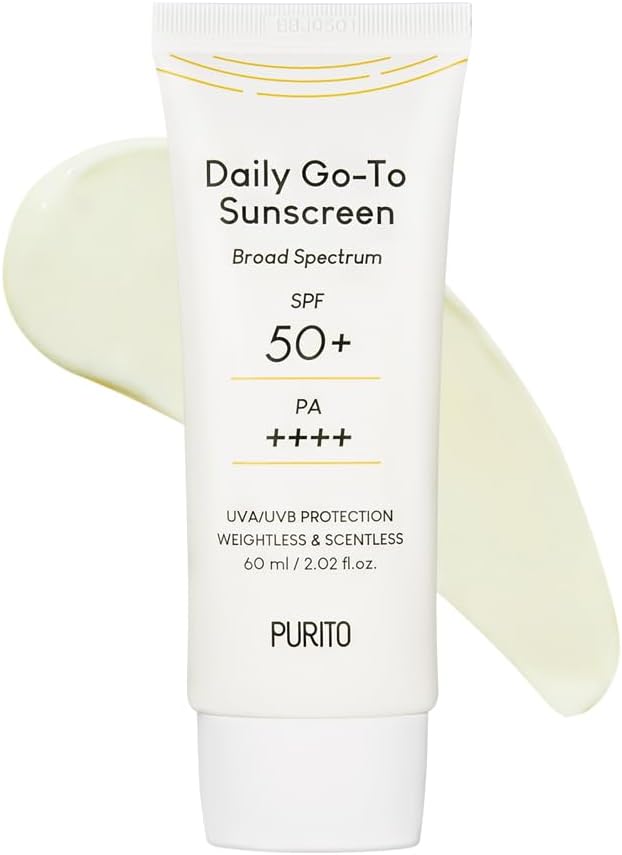About this deal
But if you add more of the filters you already had, you might exceed the regulatory limits, or they might solidify out (you get crystals in the sunscreen formula and it doesn’t work anymore). Adding different filters can get around this.
PURITO - Daily Go-To Sunscreen | YesStyle
The in vivo tests are pretty much the same around the world, but one factor that does change is the types of volunteers used. So were we all wrong to say the labeled SPF was the best data point we had? Should we stop trusting all Korean sunscreens, or Asian sunscreens? Should we only use sunscreens from large Western manufacturers? Why did cosmetic formulators and scientists who understand sunscreen wait till there were two in vivo SPF tests before saying anything? This also happened with another really reputable brand, New Zealand’s Cancer Society. So again, it happens to brands that are super trustworthy by any measure. I get it. Sunscreen is an emotional matter. Not only that: it’s also cancer prevention and thus, serious and not only a cosmetics matter. On top of that, emotionally charged and disappointed, it’s really easy to tweet and ‘gram things like ‘I’ll never use Asian products again!’. If that was your first reaction, please think about why you said that. Is there an underlying bias that ALL Asian cosmetics and regulations are somehow inferior to Western ones? They aren’t. Especially sunscreen tests are following very similar requirements all over the world. Incidecoder = Geek & GorgeousConsumer Council (HK), Over 80% of sunscreen performed below their labelled efficacy increase the risks of skin darkening, sunburn or even skin cancer, 15 Oct 2020. First, a recent video by the director of the Korea Skin Science Institute revealed the independent lab results of three sunscreens. Although the products were blurred out, they were easy to identify for Korean/Asian beauty enthusiasts on Reddit. One of those sunscreens tested was Keep Cool’s. Testing was done by a third-party under the standards of Cosmetics Europe’s SPF Test Method (ISO 24444). This formulation includes aloe vera leaf extract and berry blossom complex to brighten and moisturize your skin. These issues can apply to the Purito test or the INCI Decoder test. Were they both really the Purito sunscreen? Did INCI Decoder accidentally get a fake tube? Did someone somewhere along the line accidentally use the wrong sunscreen? Like AMA Labs (allegedly) did someone just completely make up the numbers? It’s really hard to be sure without any extra testing.
Purito Sunscreen | Mineral Sunscreen
With all the social media outrage directed at Purito’s false SPF claims, it’s as though the people being outraged are focused on the wrong thing. They should instead be clamoring for regulation / standardization on measuring UVA. Reply I think this is why we see a lot of sunscreens on the market where they have some really cool new filters, along with some older filters that people aren’t really that into anymore like octinoxate and oxybenzone, and that list doesn’t make a lot of sense if it was actually designed from scratch. That’s not awful, but it still falls well short of 50. Once again, I am curious as to why Keep Cool omitted that information in its announcement of the test results. For better or worse, the results made their way to the public regardless. But by someone else. Sunscreen development is also really expensive and involves months of trial and error. So say if a particular brand had an SPF 30 formula they were really happy with, but they see that everyone’s moving towards SPF 50+ products now, they might choose to just add extra filters to their existing SPF 30 sunscreen instead of trying to start from scratch again. (This process can still take months and months.)Dimitrovska Cvetkovska A, Manfredini S, Ziosi P et al., Factors affecting SPF in vitro measurement and correlation with in vivo results, Int J Cosmet Sci 2017, 39, 310-319. DOI: 10.1111/ics.12377 PA+ indicates sunscreen can provide UVA protection with a factor of Persistent Pigment Darkening (PPD) between two and four. It protects from medium UV radiation. People started worrying that all Korean beauty sunscreens were problematic, which is not necessarily the case. As mentioned, the people wearing sunscreen on a daily basis aren’t doing so for health reasons, but instead for vanity. And where vanity is concerned, UVA protection should be paramount. I will do my best to update this post as more information becomes available — likely when Klairs and/or Purito share the results from their lab tests.
sunscreens are so good and leave K-beauty: why Korean sunscreens are so good and leave
Firstly if your filters aren’t broad spectrum enough if they’re not covering a wide enough range of wavelengths, then you’re going to have to put in other filters in there to cover the rest. Something very broad spectrum like zinc oxide can be the only filter in a sunscreen. Wong M. Purito Sunscreen and All About SPF Testing. Lab Muffin Beauty Science. December 10, 2020. Accessed October 31, 2023. One of the sunscreen brands that got caught in this AMA Labs mess was Sunsense. I consider them to be one of the best sunscreen brands in Australia, and they publish a lot of peer-reviewed research and collaborate with dermatologists continuously. In consumer tests, Sunsense sunscreens have fallen short – the AMA Labs test could be to blame.Another related point was that since larger Western international brands didn’t have sunscreens with lighter textures and lower percentages of actives, Asian sunscreens had to be lying.
Related:
 Great Deal
Great Deal 